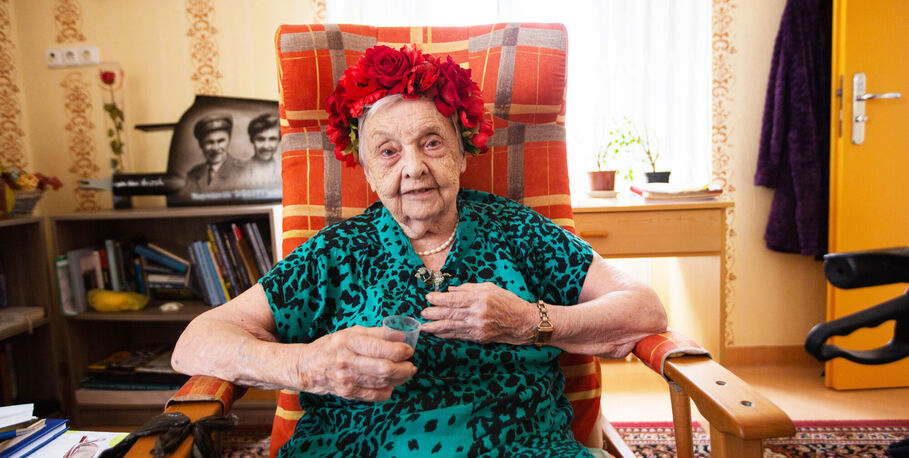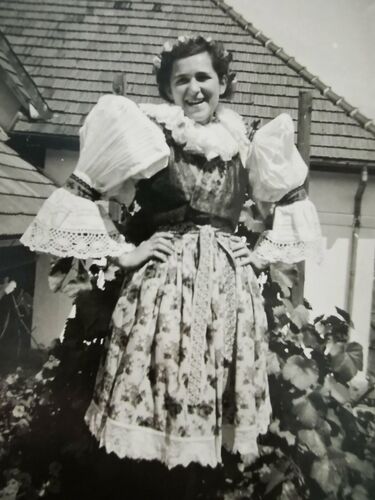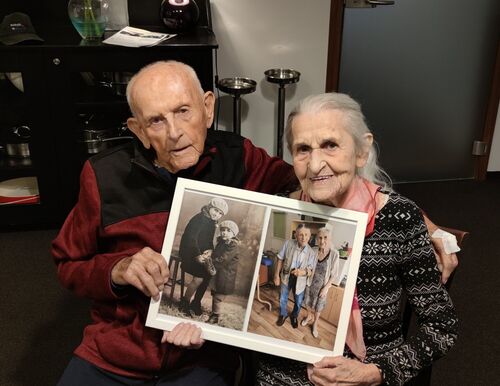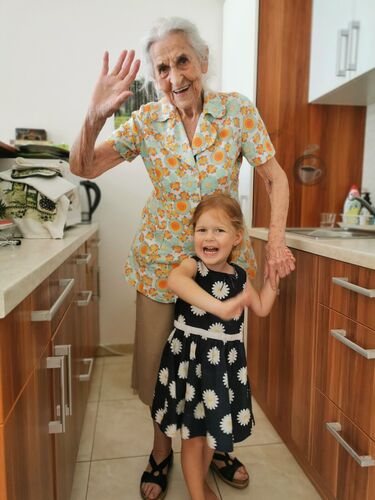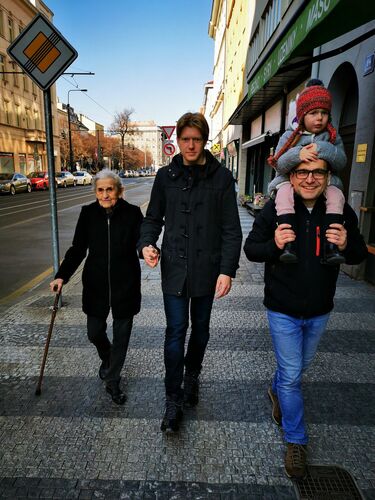Katka, could you start by telling us a bit about your grandmother? What was she like?
She was incredibly humble, meticulous, optimistic, and supportive of the whole family. She had a very strong will to take care of herself. More than anything, she wanted to spend the rest of her life at home. Her stories from the war were truly enriching — they made you realize how little we have to complain about. Throughout her life she kept a healthy lifestyle and exercised on her own at home. Every day, until her fall, she went for walks twice a day, accompanied by a personal assistant or a care worker.
At what point did you decide to arrange personal assistance?
From around the age of 80, my grandmother struggled with significant hearing loss. By the time she was about 97, her eyesight had also deteriorated a lot. Until then, she had been shopping and cooking on her own. At first, I arranged for a care worker to visit twice a week for an hour. Later came meal deliveries and daily visits from the care worker — mainly to accompany her on the walks she loved so much.
What did it mean for you to have a personal assistant helping your grandmother? How did it affect her well-being and yours?
My grandmother was very happy to have someone accompany her on walks, and I was relieved knowing she could enjoy them safely. Over time, the visits also gave me peace of mind — reassurance that everything was fine at home, even though I called her almost every day using a special phone.
What were the hardest moments when your grandmother’s health began to deteriorate?
She was doing fairly well until her fall in August 2024. Even at 95, after a hip fracture, she returned to her own flat and continued living there independently, in her usual routines. Over time, the hardest part became communication. We could no longer tell each other everything or agree on certain things — simply because she was completely deaf. After the fall, the most difficult moments were deciding what to do next and dealing with her condition in health-care facilities, where people of such advanced age are often written off from the start. That was already happening when she was 95.
When did you first realize that the system of senior care wasn’t working as it should?
Right from the first medical facility. Patients being tied down, staff unwilling to put in hearing aids, transfers to different wards in other parts of Prague without informing us…
Can you describe what shocked you the most about the conditions in the long-term care hospital?
The total lack of respect for people. The absence of humanity and empathy.
Which situations felt the most undignified to you?
Feeding patients while they lay flat, in a way that resembled feeding animals. Changing diapers only at scheduled times — not according to actual needs. Reluctance to put in hearing aids, with comments like, “Who knows what her hearing is actually like.” And the way families are expected to say goodbye after the patient dies.
Were you able to speak with the staff or management about your concerns?
I tried to communicate often. I truly appreciated the work of the staff — I understand completely that their job is extremely hard. That’s why I always offered to help with feeding and brought them coffee or small treats to brighten their day. But whenever we talked, all I heard was that they give each patient a cocktail of medications to keep them calm, that palliative care isn’t an option, that they don’t have time to deal with hearing aids, and so on.
The final farewell to your grandmother, after she passed away, was very unfortunate, wasn’t it?
I still can’t understand it. When the doctor phoned to tell me my grandmother had died, I asked if I could come to say goodbye. We even agreed on a specific time — but when I arrived, everything was different. There was complete misunderstanding and arrogance from the nurse on duty. My grandmother had already been taken to the morgue, located in the technical part of the building next to a tractor, behind wooden doors.
Her jaw had already been tied up so it wouldn’t drop open. Her hands were bound, and her name was written across one arm with a marker, and her birth number across the other. That was the last way I saw her. That’s how I had to say goodbye. The management’s response to my complaint was brief and completely lacking any understanding of the situation.
What changes would you like to see in the Czech system of senior care?
Definitely the introduction of palliative care. More empathy, humanity, and understanding. A dedicated, dignified space for families to say goodbye. And more high-quality facilities like Sue Ryder.
How has this experience changed your view of ageing and caring for older people?
Sadly, I often come to the conclusion that the problem lies within society as a whole — in our attitude toward old age and death. In every facility we visited while caring for my grandmother, it was obvious that most residents received no visits from their families. Everyone today has too much on their plate — their own family, responsibilities. But we should all find time for our loved ones. Of course, there are cases where distance or family circumstances make it difficult, so I don’t want to judge everyone the same way.
What do you think would help families who care for elderly relatives?
From my experience, definitely a “mobile general practitioner.” Often we didn’t know whether a problem was serious enough to require hospital examination. And every “trip” to a medical facility is extremely demanding in every respect — for the senior as well as the caregiver.
Why did you decide to speak publicly about these issues?
My grandmother was the last member of my family. Maybe that’s why I feel an even stronger desire and determination to push for change — so that others won’t have to go through what we did. Especially in long-term care hospitals, where time seems to have stopped. When I talk about the problems we experienced, many people tell me similar stories. They just don’t have the strength to speak about it publicly, and they’d rather forget it as quickly as possible. But I don’t want that. I truly wish for at least a small change for the better.
Do you see any positive developments in senior care in recent years?
I do see major efforts in the hospice sector, and I’m very grateful for that. But sadly, many elderly people don’t fall under hospice care — simply because they’re “just old.” Like my grandmother. She was 102, but until the injury she was basically healthy and almost independent. After surgery, she was recovering well, but because she was deaf, she was viewed as non-communicative. The anesthesia certainly didn’t help either. Unfortunately, I don’t see many improvements in senior care overall. I do see the efforts of various organizations and foundations — for example, helplines that give caregivers basic guidance, which I think is great. But systemic change still feels very far away.
What do you think would help the oldest generation feel dignified and loved?
More facilities like Sue Ryder. Proper wages and recognition for frontline care staff. And incorporating education in schools that fosters a positive, respectful approach to ageing.
If you could send a message to your grandmother now, what would it be?
Thank you for everything. I will always cherish the time we spent together — and there was a lot of it. I admire you deeply for what you lived through during the war and for your incredible resilience. And I’m sorry I didn’t manage to move you in time so that your passing could have been dignified and peaceful.

